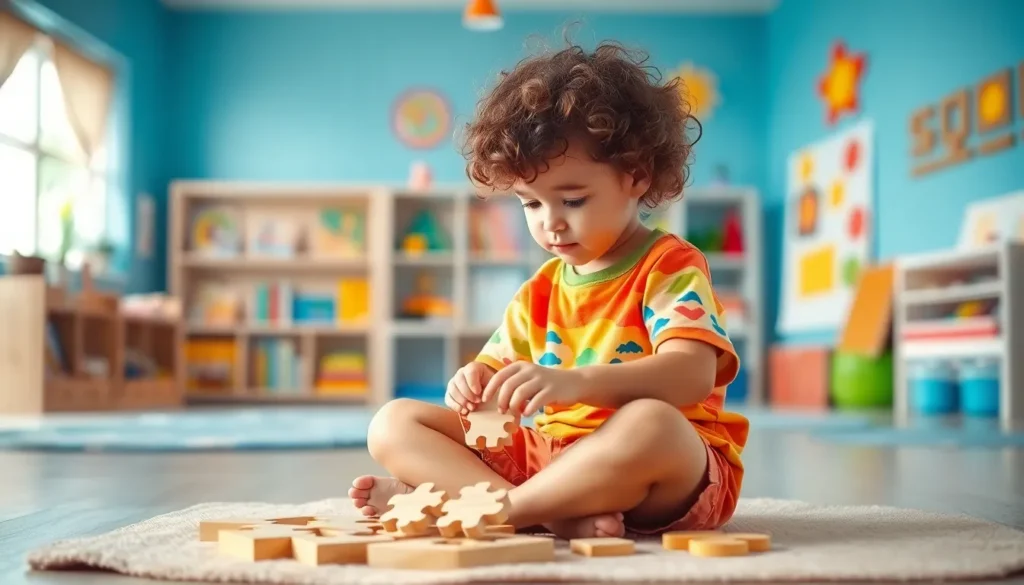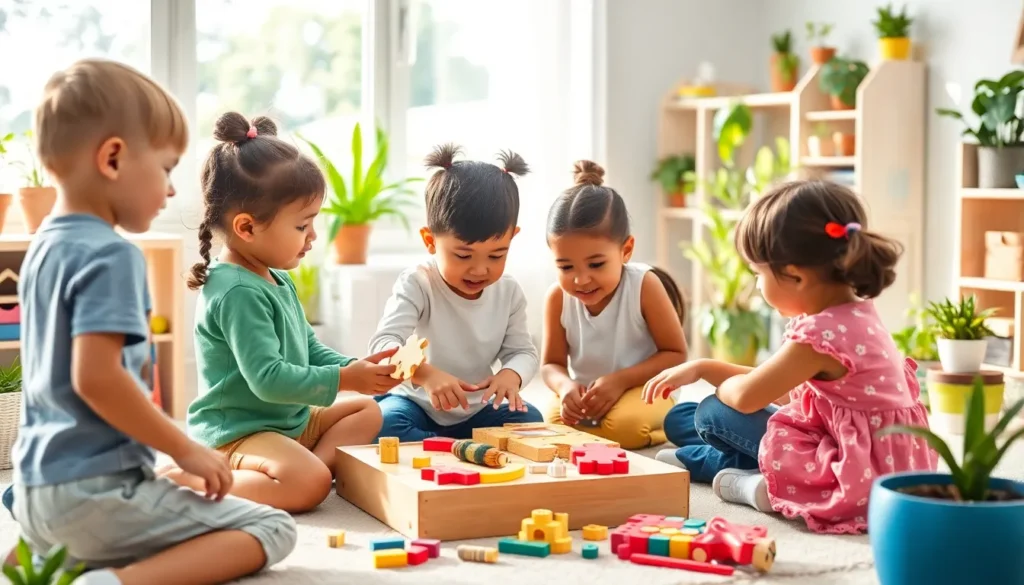Table of Contents
ToggleIn a world where parenting advice often feels like a game of telephone, Montessori parenting stands out as a refreshing approach. Imagine a style that encourages children to explore their interests and learn at their own pace, all while keeping the chaos of toddler tantrums at bay. Sounds like a dream, right? Well, it’s not just a dream; it’s Montessori magic in action!
What Is Montessori Parenting Style?
Montessori parenting style centers on fostering independence and creativity in children. This approach encourages children to explore their interests freely while developing their skills through hands-on experiences. It emphasizes respect for a child’s natural development, recognizing that each child learns at their own pace.
Parents using the Montessori method provide an environment rich in opportunities for exploration. They prepare spaces filled with age-appropriate materials that stimulate curiosity and learning. Familiar examples include wooden toys, art supplies, and books, which promote open-ended play and self-discovery.
Montessori parenting incorporates specific practices to nurture a child’s growth. These practices include:
- Child-Led Learning: Parents observe children’s interests, allowing them to choose activities that spark their curiosity.
- Freedom Within Limits: Parents establish clear boundaries while giving children the freedom to make choices within those limits.
- Hands-On Activities: Engaging children in practical life skills, such as cooking or gardening, enhances their development.
- Respectful Communication: Parents communicate with children respectfully, promoting a sense of autonomy and self-confidence.
The Montessori philosophy also emphasizes the importance of fostering a strong parent-child relationship. Parents actively engage in their child’s learning, showing genuine interest in their experiences. This involvement builds trust and encourages children to express themselves openly.
Overall, Montessori parenting creates a nurturing environment that supports a child’s individuality and promotes lifelong learning.
Key Principles of Montessori Parenting


Montessori parenting relies on several key principles that foster a child’s natural development, highlighting the importance of independence, responsibility, and social interactions.
Child-Led Learning
Child-led learning empowers children to choose their activities based on their interests and curiosities. Parents observe and provide resources rather than dictate tasks, fostering a love for learning. For example, if a child shows interest in nature, parents can present books or materials related to plants and animals. This approach promotes intrinsic motivation, ensuring that children engage deeply with subjects that attract their attention.
Independence and Responsibility
Independence and responsibility are cornerstones of Montessori parenting. Parents encourage children to take on age-appropriate tasks, such as dressing themselves or preparing snacks. Independence builds confidence, while responsibility nurtures accountability. For instance, a toddler might water plants, fostering a sense of care and ownership. Such practices cultivate skill development and help children understand the value of their contributions to family life.
Mixed-Age Interactions
Mixed-age interactions create rich learning environments where children of different ages engage together. This diversity allows younger children to learn from older peers, while older children reinforce their knowledge by teaching or helping. For example, in a cooperative setting, an older child may assist a younger child with a puzzle, enhancing both communication skills and social bonds. These interactions encourage empathy, collaboration, and respect for differing perspectives.
Benefits of Montessori Parenting Style
Montessori parenting offers numerous advantages that promote children’s holistic development. This approach cultivates an environment where children thrive and learn naturally.
Fostering Creativity
Montessori parenting encourages children to explore their creativity through open-ended activities. Parents provide materials like art supplies and building blocks, enabling children to express themselves freely. Engaging in choice-driven activities sparks imaginative play, allowing children to develop original ideas and solutions. By facilitating creative exploration, children learn to view challenges as opportunities for innovation, fostering lifelong creative thinking skills. Parents support this process by observing without intruding, which enables children to take ownership of their creative endeavors.
Enhancing Problem-Solving Skills
Montessori parenting enhances children’s problem-solving abilities by allowing them to navigate challenges independently. Parents present age-appropriate tasks that require critical thinking, encouraging children to find solutions through experimentation. Opportunities for trial and error enable children to learn from mistakes, thus developing resilience and adaptive skills. Moreover, mixed-age interactions promote collaborative problem-solving, as children learn from one another’s perspectives. This environment nurtures analytical thinking and decision-making skills, essential for future academic and life successes.
Implementing Montessori at Home
Montessori parenting thrives in a home environment that promotes exploration and independence. Implementing this method involves creating spaces that encourage self-directed learning and engagement.
Creating a Prepared Environment
Creating a prepared environment means arranging spaces that invite curiosity. Furniture should be child-sized, allowing easy access to materials. Organizing toys and learning resources reflects order and accessibility, encouraging children to select activities independently. Age-appropriate materials—such as books, art supplies, and puzzles—provide diverse learning experiences. Incorporating natural elements, like plants or wooden toys, enhances sensory exploration. Observing children’s interests and adjusting the environment fosters a sense of ownership and responsibility.
Practical Life Activities
Practical life activities form the backbone of Montessori learning. These activities nurture skills essential for everyday life, promoting independence through tasks like pouring, sweeping, or dressing. Engaging children in cooking, gardening, or setting the table develops coordination and concentration. Empowering children to care for their environment instills responsibility and confidence. By encouraging hands-on experiences, parents facilitate problem-solving skills and promote a sense of achievement. Integrating these activities into daily routines provides meaningful learning opportunities while reinforcing the principles of self-sufficiency and autonomy.




